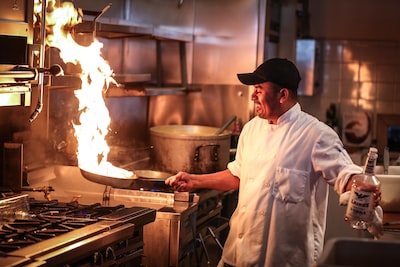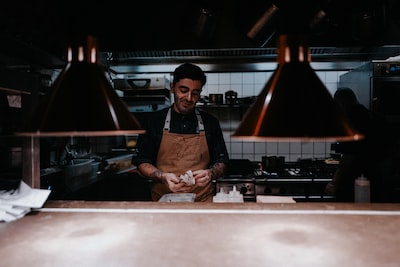When it comes to the culinary world, talent and dedication are undeniably crucial for chefs and cooks to succeed. However, another less acknowledged issue plagues this industry—the occurrence of impersonations.
Whether it’s a skilled imposter masquerading as an acclaimed chef or a novice cook trying to pass off mediocre skills as those of a seasoned pro, these cases can lead to disappointment and even danger for unsuspecting diners. But fear not, for AI kitchen safety measures are here to save the day! By leveraging the power of artificial intelligence, restaurants and eateries can now implement advanced systems that detect and prevent chef/cook impersonations, ensuring the authenticity and quality of your dining experience.
In the vast world of culinary wizardry, where a perfect recipe can transport our taste buds to unparalleled heights, a new disruptive force is emerging – artificial intelligence. But wait, before you let your mind wander to a future filled with robot chefs churning out gourmet meals, let’s pause and ponder the perplexing issue of AI kitchen safety measures.
Yes, ladies and gentlemen, as AI increasingly infiltrates our bustling kitchens, one pressing concern looms large: chef/cook impersonation prevention. With the rise of sophisticated algorithms and machine learning, it’s no longer far-fetched to imagine a day when AI systems flawlessly mimic the skills and techniques of master chefs.
Yet, with this feigned culinary prowess comes a dire need to establish safety protocols that protect both our meals and our Michelin-starred reputations. After all, the last thing any food aficionado wants is to unknowingly savor a gastronomic creation prepared by a rogue AI, masquerading as a seasoned chef.
The implications are mind-boggling, and the consequences of overlooking this issue could result in more than just a sour taste in our mouths. Picture a world where unsuspecting diners are served meals cooked by AI imposters, lacking the fine discernment and intuition that only human chefs possess.
Would we be able to distinguish a genuine culinary masterpiece from an algorithmically engineered replica? Would the magic of a well-timed dash of spice or a perfectly seared scallop be reduced to lines of code? These are questions that demand our attention, as the boundaries between authentic culinary craftsmanship and AI innovation become increasingly blurry. While some may argue that AI-driven kitchen assistants could improve safety by reducing human error and streamlining cooking processes, the potential risks they pose cannot be ignored.
The need to establish robust authenticity checks and identity verification systems is paramount in order to prevent calamitous incidents that could tarnish the hallowed sanctuaries of our favorite culinary establishments. So, as we embark on this brave new culinary frontier, let us not be carried away by the allure of AI’s limitless possibilities.
Rather, let us approach this disruptive force with caution, ushering in a new era of kitchen safety measures that protect both our palates and the authenticity of the culinary arts. Only then can we savor the delights of a technological gastronomic revolution without compromising the essence of what truly makes our favorite dishes a work of art – the human touch.
Table of Contents
Introduction to AI’s increasing role in kitchen safety.
Fraud prevention in professional kitchens using AI is now a pressing concern. The rise of automation and machine learning infiltrates every aspect of our lives.
In this cutting-edge article, we explore the intersection between artificial intelligence and kitchen safety. With the growing popularity of autonomous cooking devices and virtual cooking assistants, the risk of chef/cook impersonation is increasing.
This phenomenon presents implications for consumers and restaurant owners. How do we ensure that the food we consume is prepared by a certified professional and not an AI program? How can AI be used to identify and prevent fraudulent kitchen activity? Join us as we delve into this topic and uncover the role AI plays in protecting our palates and maintaining the integrity of our dining experiences.
Understanding the risks of chef/cook impersonation in restaurants.
The rise of artificial intelligence in the digital era brings new possibilities and challenges. One such challenge is kitchen safety and preventing chef impersonation.
AI technology is becoming more sophisticated, raising concerns about unauthorized users imitating trained chefs and endangering customers and restaurant reputations. Understanding the risks of chef impersonation is crucial for the hospitality industry.
Fortunately, AI itself can provide a solution. Detecting anomalies in cooking styles and behaviors through robust algorithms can prevent cook impersonation with AI.
By analyzing data and patterns, AI systems can identify and stop impostors from causing chaos in the kitchen. As AI technology evolves, it becomes an indispensable tool for maintaining kitchen safety, allowing chefs and cooks to focus on creating exquisite cuisine.
Implementing AI solutions to prevent impersonation and ensure safety.
AI has revolutionized every industry, including our kitchens. With smart appliances and connected devices on the rise, there is an increased potential for kitchen safety hazards.
However, companies are developing AI solutions to address this issue and ensure safety. These AI kitchen safety measures use advanced algorithms to detect unauthorized individuals attempting to use chef or cook equipment.
By analyzing movement patterns, facial recognition, and voice identification, these AI systems can alert users and take necessary precautions to prevent accidents or misuse. The effectiveness and ethical implications of this technology are still open questions.
While some argue that it reduces human error, others are concerned about privacy invasion and potential bias in AI systems. As AI continues to disrupt our lives, it is important to carefully consider how we implement these technologies and find a balance between safety and privacy.
Role of facial recognition technology in detecting impostors in kitchens.
The kitchen is where creativity and precision meet. Chefs and cooks combine flavors and techniques to create delicious food.
But there is a hidden danger – people pretending to be chefs and cooks. In today’s world, facial recognition technology is important to identify these impostors.
By analyzing facial features and expressions, this technology can detect discrepancies and alert authorities. This is a significant development, as the kitchen becomes a battlefield where authenticity and safety are important.
It sets the stage for a culinary revolution, where AI and humans work together to protect the kitchen.
Training AI systems to recognize unique cooking techniques and styles.
As AI technology advances, it is essential to prioritize kitchen safety in the culinary arts. The latest development in this field involves training AI systems to recognize and distinguish unique cooking techniques and styles, preventing impersonation by chef or cook alike.
To accomplish this, AI algorithms are being fed with substantial amounts of data, enabling them to understand and identify the individualistic traits of each chef’s cooking. By incorporating this technology into commercial kitchens, we can achieve a new level of safety.
AI will serve as a vigilant supervisor, minimizing risks and preventing mishaps in the fast-paced and unpredictable kitchen environment. Get ready for a kitchen revolution driven by the disruptive potential of AI!
Future prospects for kitchen safety with AI advancements.
In kitchen safety, innovation is always evolving, and AI advancements will disrupt the industry in unprecedented ways. Preventative measures are crucial due to the rise of chef/cook impersonation.
AI technologies can help guard against such fraudulent behavior by analyzing voice patterns and facial recognition. Moreover, AI-powered smart appliances can detect gas leaks or overheating and take immediate action to reduce risks.
The future of kitchen safety with AI looks promising, as these advancements aim to create a secure and trustworthy culinary environment. AI is revolutionizing safety in home kitchens and professional restaurants.
Cleanbox: The Advanced AI Solution Safeguarding Chefs and Cooks from Online Impersonations
In a digitally interconnected world, where cyber threats are rampant, it’s crucial to safeguard ourselves from online impersonations. This holds particularly true for influential figures like chefs and cooks, whose professional reputation relies heavily on their online presence and interactions.
Enter Cleanbox, the ultimate weapon against chef/cook impersonations. Powered by advanced AI technology, Cleanbox acts as a gatekeeper for your inbox, meticulously scanning incoming emails to detect any fraudulent or malicious content.
With its revolutionary sorting and categorizing capabilities, Cleanbox intelligently separates priority messages from unwanted clutter. This not only saves time and ensures important communications don’t get lost in the chaos but also acts as a shield against phishing attempts and identity theft.
Rest easy knowing Cleanbox has your back, protecting your digital identity while you focus on what you do best – creating culinary masterpieces.
Frequently Asked Questions
Chef/Cook Impersonation Prevention is a feature implemented in AI systems to ensure that only authorized and trained individuals operate kitchen equipment and perform cooking tasks.
AI disrupts kitchen safety by providing advanced technologies that can detect unauthorized individuals attempting to impersonate chefs or cooks, thus preventing potential accidents or misuse of kitchen equipment.
Chef/Cook Impersonation Prevention enhances kitchen safety by reducing the risk of accidents caused by unauthorized personnel using kitchen equipment. It also helps maintain food quality and consistency by ensuring that only skilled and trained professionals are involved in the cooking process.
Chef/Cook Impersonation Prevention works by utilizing AI algorithms and facial recognition technology to authenticate the identity of individuals before granting them access to kitchen equipment. It can verify the authorized personnel’s identity based on stored data or real-time verification.
While the Chef/Cook Impersonation Prevention feature employs advanced technologies, it is not completely immune to potential bypass attempts. However, constant updates and improvements are made to enhance security and minimize the risk of unauthorized access.
Chef/Cook Impersonation Prevention may have limitations in scenarios where individuals wear disguises or if the facial recognition technology encounters issues with accurate identification. However, these limitations can be overcome through the integration of additional security measures or improvements in AI technology.
Chef/Cook Impersonation Prevention raises privacy concerns as it involves capturing and storing facial recognition data. To address these concerns, it is crucial to implement robust privacy policies and ensure secure storage and limited access to the collected data.
While the adoption of Chef/Cook Impersonation Prevention is growing, its usage in commercial kitchens may vary. Larger establishments or high-security kitchens may have implemented this technology, whereas smaller kitchens or traditional setups may rely on manual identification and verification processes.
Chef/Cook Impersonation Prevention can contribute to increased efficiency in the kitchen by ensuring that only trained personnel operate the equipment. This reduces the risk of accidents, minimizes downtime due to equipment misuse, and helps maintain a smooth workflow.
In addition to Chef/Cook Impersonation Prevention, other safety measures in the kitchen include proper training for employees, regular equipment maintenance, adherence to safety guidelines, and the use of safety equipment such as gloves and aprons.
Summary
In a world where imitation strives to claim the throne of creativity, artificial intelligence (AI) emerges as a formidable ally against the deceitful actors of gastronomy. With its ability to analyze vast amounts of data, AI has revolutionized the culinary landscape, providing a shield against those who would dare to impersonate the meticulous artistry of a professional chef.
By harnessing the power of machine learning algorithms, AI can detect subtle nuances and patterns in recipe creation and cooking techniques, unravelling the secrets of a true culinary mastermind. Through sophisticated algorithms and neural networks, AI brings a digital sentinel into our kitchens, monitoring the authenticity of every meal prepared.
The uncanny accuracy of AI’s discernment is a testament to the symbiotic relationship forged between human ingenuity and technological advancement. While the insidious impersonators still lurk in the shadows, AI stands as a beacon of hope, illuminating the path towards genuine culinary experiences.
In this battle against culinary deception, the fusion of human expertise and AI’s analytical prowess becomes an unstoppable force, preserving the sanctity of culinary artistry for generations to come. So, let us celebrate this harmonious coexistence, cherishing the knowledge that in the realm of gastronomy, AI not only protects but elevates the humble cook, ensuring that the flames of authenticity burn ever bright, safeguarding the distinctive tastes and flavors that make the culinary world so enchanting.







 in Wyoming
in Wyoming